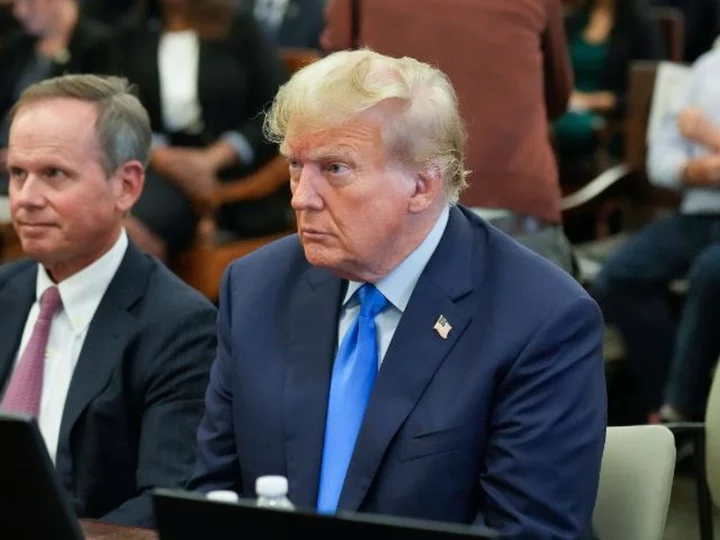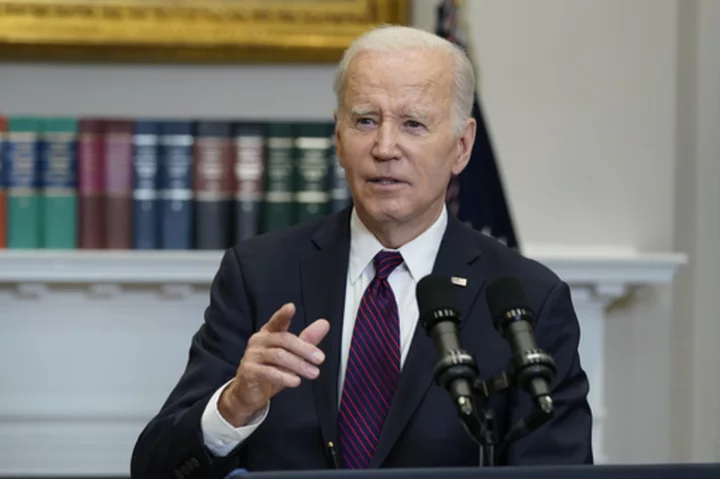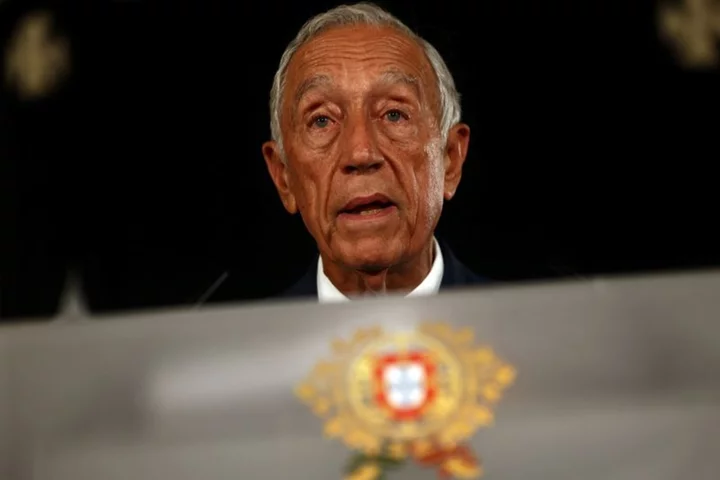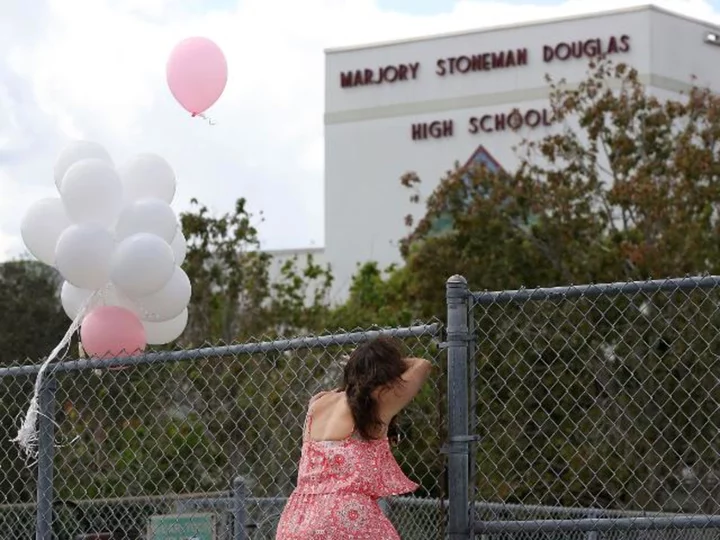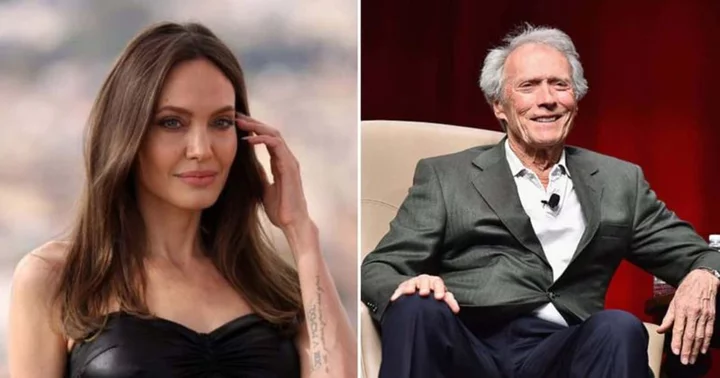Former President Donald Trump showed up at a Manhattan courtroom for the opening day of the New York civil case against him and his namesake company attacking the judge in the case and the New York attorney general at every possible moment.
Trump's appearance turned the courthouse into an extension of the campaign trail, where he has railed against the four criminal indictments against him, and now, a civil case where Judge Arthur Engoron ruled last week that Trump and his co-defendants were liable for fraud.
Inside the courtroom, Trump's attorneys also sparred with the judge as opening statements began, a sign that they're likely to take a combative approach with a trial that the judge expects to last into December.
Here's what to know from the first day of Trump's trial:
Trump turns the courtroom into a campaign stop
Trump's arrival at the downtown Manhattan courthouse Monday morning turned the event into a spectacle of his own making. Even though he did not have to appear, the former president used the opportunity to bolster his presidential campaign.
The New York attorney general's case is civil, not criminal, but it threatens his business in New York, and Trump's appearance underscored that he views it as urgently as the other cases against him brought in other state and federal courts.
In front of the cameras and on his social media site, Trump attacked New York Attorney General Letitia James for bringing the case against him. He attacked the judge for the ruling last week. And he sought to tie them to special counsel Jack Smith's criminal indictments, even though they are unconnected.
"This has to do with election interference, plain and simple," Trump said before walking into the courtroom. "They're trying to damage me, so I don't do as well as I'm doing in the election."
When he left the courtroom on a lunch break, Trump returned to the cameras in the hallway -- twice -- to rail against what he had heard. Trump attacked the judge as an "operative" and said he should be disbarred for ruling against him.
Asked why he showed up in person Monday, Trump returned to a familiar refrain: "Because I want to watch this witch hunt myself."
Attorney general asks to ban Trump from doing business in New York
The attorney general's office made clear Monday that it plans to go for the jugular.
Kevin Wallace, an attorney for the AG, urged the judge in his opening statement to bar Trump -- who rose to fame and power over 50 years with a real estate empire -- from doing business in New York.
Wallace alleged that Trump and his co-defendants conspired to commit persistent and repeated fraud and that Trump's financial statements convinced banks to take on hidden risk "to the tune of hundreds of millions of dollars."
"While it may be one thing to exaggerate for Forbes magazine ... you cannot do it while conducting business in the state of New York," Wallace said.
The opening statement underscored the risk the case poses to Trump and the Trump Organization, the former president's business in New York, where Trump built up his name and image before he launched the political campaign that led him to the White House in 2016.
James brought the $250 million lawsuit last September, alleging that Trump and his co-defendants committed fraud in inflating assets on financial statements to get better terms on commercial real estate loans and insurance policies.
Last week, Engoron ruled that Trump and his co-defendants were liable for "persistent and repeated" fraud. Trump and his companies could be forced to pay hefty sums in damages for the profits they've allegedly garnered through their fraudulent business practices.
In the trial that began Monday, Engoron will consider just how much the Trumps and their businesses will have to pay, and whether they could be banned from engaging in commercial real estate transactions in New York or borrowing from New York banks.
The attorney's general office is seeking in the trial to prove six additional claims, including falsifying business records, issuing false financial statements and insurance fraud.
Trump's lawyers say this is how real estate works
With the former president looking on, Trump's lawyers argued Monday that the attorney general's case was flawed, saying that the differences in valuations were just part of the commercial real estate business.
Trump attorney Christopher Kise argued there was no intent to defraud and "no victims" in the case.
Kise pointed to documents from Deutsche Bank showing the bank valued Trump's net worth $2 billion less than Trump did -- but still underwrote the loan for Trump.
"They were eager," he said.
"This is what happens every day in this city," he added.
Trump attorney Alina Habba also spoke during opening arguments, attacking the judge's finding in last week's ruling that valued Mar-a-Lago at $18 million (the judge said Monday that his ruling did not specifically value Mar-a-Lago at $18 million, but was citing Palm Beach tax records).
Mar-a-Lago would be sold for at least $1 billion, Habba claimed.
"The value is what someone is willing to pay. The Trump properties are Mona Lisa properties," she added. "That is not fraud, that is real estate."
Judge spars with Trump attorneys
After Habba finished her opening statement -- which attacked James for campaigning that she would "get Trump" -- Engoron pushed back against the Trump attorney.
The judge noted that the defense team already had tried to dismiss the case claiming by claiming James brought it as a "witch hunt" against Trump. He had already denied the motion, Engoron said, and his ruling had been affirmed by a New York appellate court.
"So Ms. James' motivations are no longer at issue in this case, are they?" Engoron said.
The judge also sparred with Habba over a discussion about an accounting disclaimer for Mazars, Trump's former accounting firm. The disclaimer essentially said, "We're relying on the Trump Organization," Engoron said. "That's how I read it."
"No, your honor," Habba responded, arguing that the Trump Organization relied on Mazars and "they're the accountants."
Trump watched intently during the back and forth between Habba and Engoron.
Later, Kise argued that the problem with the judge issuing summary judgment is that "you haven't heard the evidence.
"You owe it to the defendants to listen to the evidence," Kise said. "We have to at least give these witnesses the opportunity to take the stand."
Kise and Engoron debated whether a valuations expert's testimony at trial would be considered evidence.
"I intend to be very patient and liberal in listening to things," Engoron said to Kise
The exchanges underscored how the upcoming trial is going to be contested -- especially when the judge, and not a jury, will decide the outcome.
Trial is going to last a long time -- and will get in the financial weeds
Kicking off the trial Monday morning, Engoron confirmed that he expects the trial to last more than two months -- until December 22, the Friday before Christmas.
The trial is also going to get into the financial weeds, as the New York attorney general's office and Trump's lawyers debate financial statements, accounting practices and valuations of property.
Wallace's opening statement for the attorney general referenced statements of financial condition and played clips of depositions with Trump's children, Eric Trump and Donald Trump Jr., while addressing "GAAP," the Generally Accepted Accounting Principles.
The first witness the attorney general called Monday was Donald Bender, Trump's long-time accountant at Mazars USA. Bender has since retired from the firm and Mazars no longer prepares Trump's taxes. The firm resigned and said Trump's financial statements should no longer be relied upon.
While Trump and his children are expected to be called as witnesses in the trial -- appearances that are sure to provide some fireworks -- much of the trial is going to focus on the nitty gritty of accounting that's at the heart of the attorney general's case that now threatens Trump's business.

